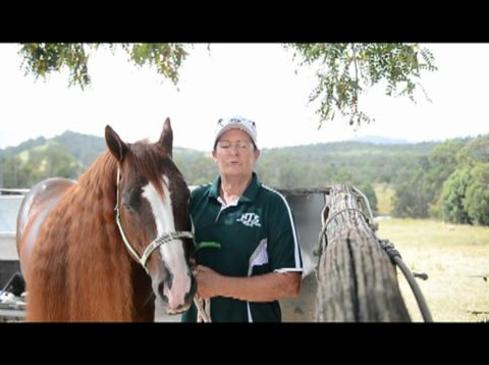Geelong scientists uncover new type of deadly Hendra virus in fruit bats
Geelong scientists have released details of a new type of Hendra virus, which can cause severe and fatal disease in both infected horses and humans, in flying foxes.

Geelong
Don't miss out on the headlines from Geelong. Followed categories will be added to My News.
Geelong scientists have uncovered a new type of Hendra virus, which can cause severe and fatal disease in infected horses and humans, in flying foxes.
The findings confirm the virus can be found across a broad region of Australia.
Hendra virus can be transmitted from flying foxes, also known as fruit bats, to horses, and from horses to people.
A paper detailing the findings has been published just days after the new genetic type was detected in a horse near Newcastle in New South Wales, the most southern case of Hendra yet recorded.
Previous studies had found the virus in flying foxes in Queensland and parts of New South Wales.
After monitoring flying fox samples from 2013-2021, researchers at CSIRO’s Australian Centre for Disease Preparedness (ACDP) in Geelong found the new genetic type in flying foxes in Victoria, South Australia, and Western Australia.

CSIRO scientist Dr Kim Halpin said spillover of the disease from flying foxes to horses had still only been reported in Queensland and New South Wales.
“However, because Hendra Virus Genotype 2 is so genetically similar to the original Hendra virus, there is a potential risk to horses wherever flying foxes are found in Australia,” Dr Halpin said.
“It’s important to note that Hendra has never been reported to spread directly from flying foxes to humans – it’s always been transmitted from infected horses to humans.
“We expect this new genetic type would behave the same way.”
“And given the similarities, while more research is needed, we expect the existing Hendra virus vaccine for horses should work against this new type too.
“This finding really underscores the importance of research into flying foxes – it’s crucial to helping us understand and protect Australians against the viruses they can carry.”
Another project, called “Horses as Sentinels”, led by the University of Sydney and CSIRO detected the same genetic type earlier this year in samples collected from a horse from Queensland in 2015.
Dr Steve Dennis, President of Equine Veterinarians Australia, said the findings were a reminder there’s a risk of Hendra virus wherever there are flying foxes and horses.
“Owners and any people who interact with horses can reduce the risk of infection from Hendra virus and other zoonotic viruses through vaccination of horses or humans where available, wearing appropriate PPE, and seeking veterinary attention for sick horses,” Dr Dennis said.
The virus has a recorded mortality rate of approximately 79 per cent for horses and 60 per cent for humans who contract it.
A vaccine was developed for horses in 2012.
Flying foxes are protected species that are critical to the environment, and pollinate native trees and spread seeds.
More Coverage
Originally published as Geelong scientists uncover new type of deadly Hendra virus in fruit bats






